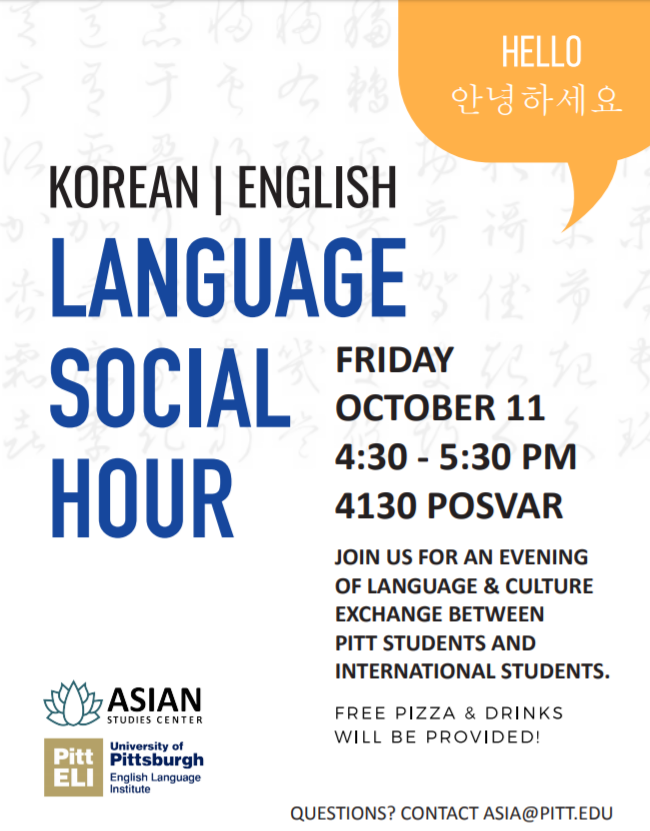The following interview is between Kirsten Strayer, Asian Studies Center staff member and programming coordinator for Screenshot: Asia, and Communications & Media intern, Jenn Nguyen. Strayer is thrilled about the recent launch and expansion of Screenshot: Asia, the Asian Studies Center and Film & Media Studies partnership to deliver Asian-American and American cinema to Pittsburgh. To learn more about Screenshot: Asia, spread the word, or donate, please visit engage.pitt.edu/screenshotasia.
How did you start working at the Asian Studies Center?
I helped run Silk Screen, an Asian and Asian-American film festival, in 2018. Subsequently, the organization folded. Lynn Kawaratani, one of the staffers at the Asian Studies Center, was an advisory board member for Silk Screen, and a few people at Pitt, including herself, were really invested in the idea of preserving Asian and Asian-American film in Pittsburgh. We were in conversation off and on with the Film and Media Studies Program until, finally, the Asian Studies Center was able to gather the materials to put on our own Asian and Asian-American film series at Pitt with them.
What do you specialize in at Pitt and at the Asian Studies Center?
At the Asian Studies Center, I specialize in programming all of the media, film, and film associated and media associated partnerships. It’s a bunch of everything – I write grants to help with the launch of the Screenshot: Asia festival, manage all of the films that come in during the year and work with Lynn and other faculty members to choose some films, and oversee all of the nuts and bolts stuff for the festival.
My technical specialty is global cinema. I have a PhD in film, and I’ve published on a bunch of different global moments in different places to invoke answers to questions about circulation. For example, I researched and wrote about how film circulated in the 70’s throughout Latin America, global Bollywood, and the contemporary film movement in the post-20th and 21st centuries.
What region do you think produces the best films?
I mean, I think they’re all so different. I’m very attached to Latin America and Mexico, obviously, because I wrote my dissertation on that region. I think film scholars are coming to terms with the idea of how there have been networks in Latin America, Africa, and Asia since the beginning of film, so if I had to choose, I’d say my favorite region for film is the southern half of the world. If I had to choose one specific region, I’d say Latin America, for sure.
You talked a little bit about Silk Screen. Can you explain exactly what the program was, and how that led you to create Screenshot: Asia?
Silk Screen was an organization dedicated to promoting Asian art and culture in Pittsburgh and was around for about 12 years until its closing. When I was there, I learned a lot about both contemporary Asian film and what was going on in the Asian film industry and the nuts and bolts of running a film festival, which is really hard and a huge time commitment. I really wanted to bring those skills to Pitt in hopes of launching an even bigger project.
For Screenshot: Asia, are you partnering with a professor in the Film and Media Studies Program or moreso with the department as a whole?
We have an executive committee, which consists of Seung-hwan Shin, Kun Qian, Charles Exley, and Neepa Majumdar. They’re basically the people that work most extensively on Asian film, but the director of the Film and Media Studies Program who is currently on sabbatical, Randall Halle, is most engaged with the series. We’ve worked with Halle a lot. He’s most excited about having a constant art and film presence in Pittsburgh and transforming the city into a place that has entertaining movies always being streamed, especially on the weekends.
The question is, “How do we take all of these celebrations – the Polish film festival, projects at Carnegie Mellon University, and the Pittsburgh Shorts film festival – and create a more coherent understanding of the arts?” Halle has a big vision for arts programming in Pittsburgh, and the Asian Studies Center tightly works with him to turn his vision into a tangible product.
What are your current favorite Asian and Asian-American films?
It’s really hard to choose one favorite. For Asian films, I love In the Mood for Love (2000) and 2046 (2004), which are both from Hong Kong. In The Mood for Love is so beautiful. I love the main actor, Tony Leung Chiu Wai, and how gorgeous and immense the film is. In general, I like every genre of film.
I love a lot of Asian classics, too, which includes anything by Japanese film directors Akira Kurosawa and Yasuijro Ozu. I love Kurosawa’s The Bad Sleep Well (1960), in particular, which is based on Shakespeare’s Hamlet. Kurosawa is the master of black-and-white film. You have to remember, Asia is so big, which means Asian film encompasses such a variety of countries and genres. I’m a fan of Iranian film, too. Some of the best projects are from Iran. It’s as if the whole world is in Asia, in certain ways.
As for Asian-American films, I love H.P. Mendoza’s Bitter Melon (2018), which was aired at Silk Screen last year. It’s a hilarious yet dark comedy about a Filipino family in San Francisco. The movie is one of the smartest takes on the contemporary Asian-American experience that I’ve seen. I’d love to screen it again for the Pitt community.


